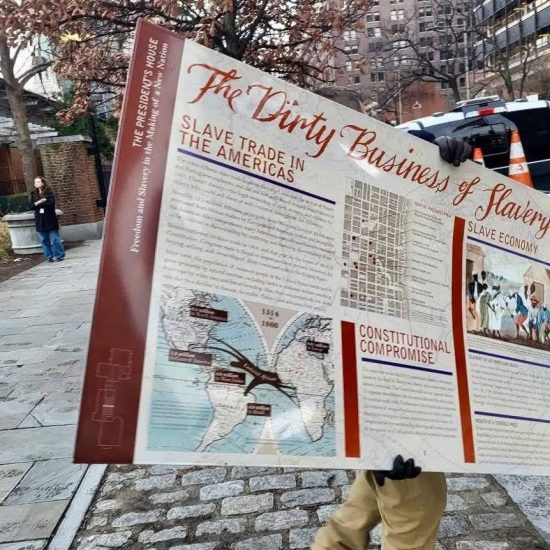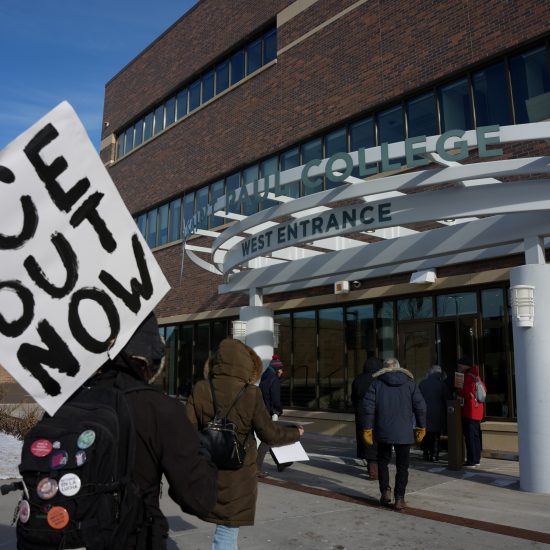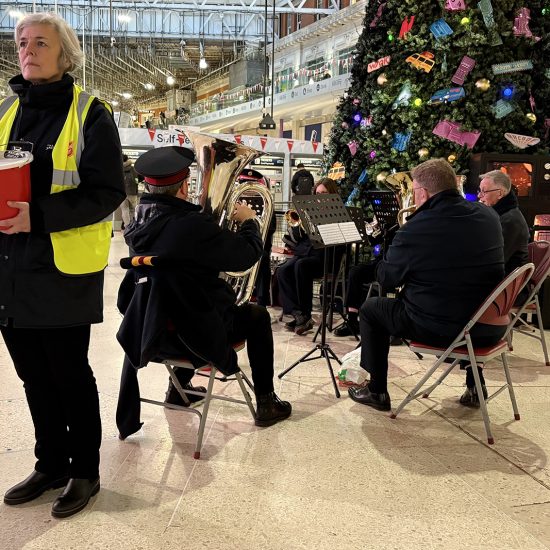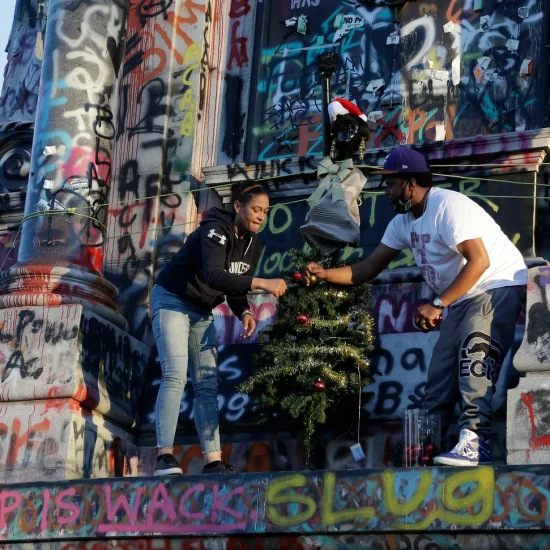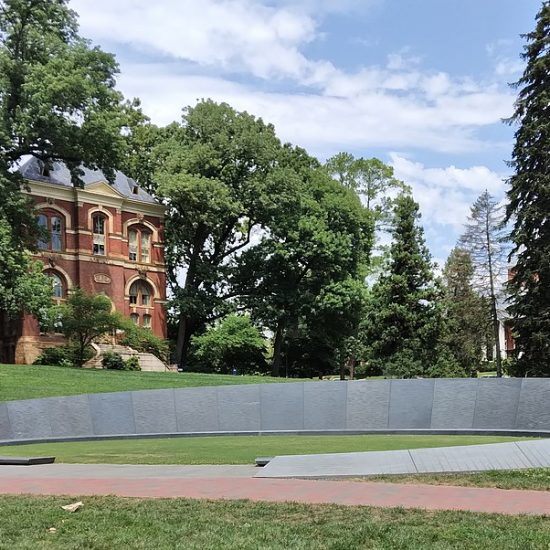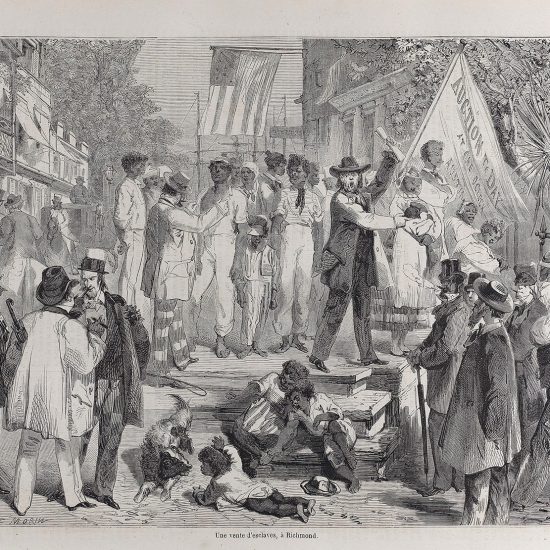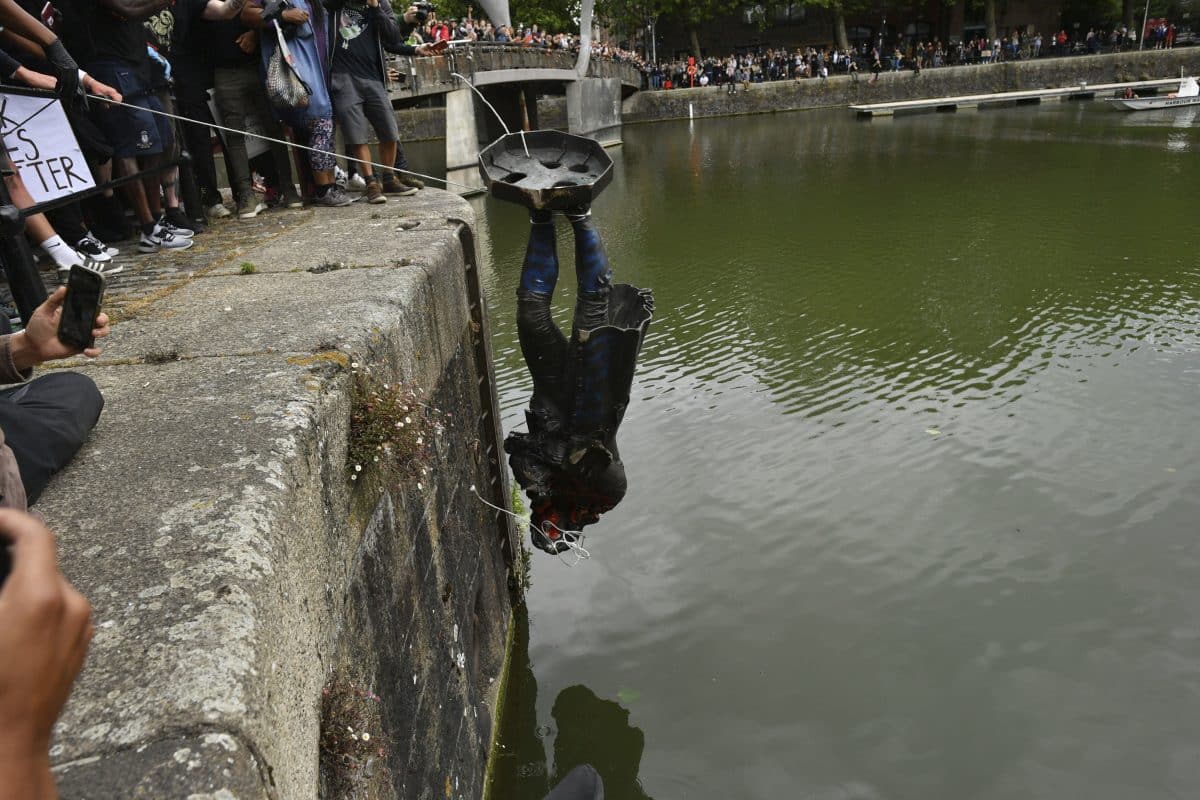
As people in Bristol, England, joined global rallies against racial injustices, some protesters on Sunday (June 7) toppled a statue of 17th century slave trader Edward Colston and tossed it into the city’s harbor. A British Baptist leader who lives in Bristol told Word&Way the statue should’ve previously been removed.
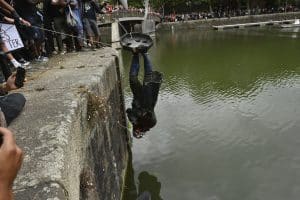
Protesters throw a statue of slave trader Edward Colston into the Bristol harbour, during a Black Lives Matter protest rally, in Bristol, England, on June 7. (Ben Birchall/PA via Associated Press)
The monument’s destruction in the southeastern English city echoed recent events in several cities across the pond as protesters in the U.S. defaced and destroyed Confederate monuments. The anti-Confederate acts came during growing “Black Lives Matter” protests following the recent police killing of George Floyd in Minneapolis, Minnesota. Monuments to slaveholders and those who fought to preserve slavery have been removed in recent weeks by protesters or government officials in Birmingham and Montgomery, Alabama; Rocky Mount; Colorado; Indianapolis, Indiana; Richmond, Virginia; and elsewhere. Protesters covered many other Confederate monuments and statues with graffiti.
Colston gained wealth and power as he rose in the Royal African Company, which dominated the English trade of enslaved persons, gold, silver, and more from the western coast of Africa. He funded many schools, hospitals, churches, and other institutions in Bristol and beyond, and he served in as a Member of Parliament for Bristol.
Tony Peck, a British Baptist who lives in Bristol and serves as general secretary of the European Baptist Federation, told Word&Way that while he did “not condone the topping of a statue by an angry mob,” he was glad the statue was no longer there. He sees Sunday’s act as the result of official inaction as the city recently started “to come to terms publicly with the legacy of the slave trade that built the city’s wealth.”
“I have long believed, with many others in the city of Bristol, that it belongs in a museum with an explanation of its significance, rather than in a place of honor on a plinth in the city center,” he explained. “Bristol City Council has dragged its feet in dealing with the issue, and yesterday’s tearing down of the statue was the result.”
“I have stood at the ‘Door of no Return’ at the former British Cape Coast Castle in Ghana where hundreds of thousands of enslaved Africans passed through. I have sat with Baptist leaders in Jamaica who have talked to me about the continuing negative effects on their country from the legacy of slavery,” Peck added. “As a city we owe it to them, as well as those who currently experience racial injustice, to initiate a better conversation about the legacy of slavery. And that should include an unwavering commitment to making racial justice an urgent priority in our institutions and in civil society as a whole.”
In 2007, Peck and other Baptists from around the globe met in Ghana for the annual gathering of the Baptist World Alliance. At that meeting, which included a visit to a castle used in the slave trade, the BWA elected Jamaican Baptist leader Neville Callam as the first BWA general secretary not from Europe or the United States. Callam, who retired from the BWA in 2017, was elected the day after the Baptist leaders held a service of memory and reconciliation at the slave castle.
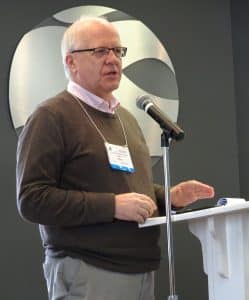
Tony Peck speaks during a 2019 Baptist World Alliance meeting in Falls Church, Virginia. (Brian Kaylor/Word&Way)
Peck told Word&Way he now hopes that with the Colston statue gone, even more work can be done in Bristol to honestly address the slave-trading past — including recognition of a key Baptist figure.
“What I hope and pray is that the city can move on from here to truly face up to its past and the continuing vested interests that date from the era of slavery and slave traders, and that both institutions and civil society in Bristol can be unequivocal in their commitment to racial justice and equality in what is now a vibrant multi-racial city,” Peck added.
“There are better stories to tell,” he added. “For example, the Baptist missionary William Knibb, who went out from Bristol and played a key role in the ending of slavery in Jamaica.”
Knibb, who served as a missionary in Jamaica from 1824 until his death in 1845, returned to England during that period to testify before Parliament in support of the abolition of slavery. In 1988 — the 150th anniversary of the abolition of slavery in the British Empire — Jamaica recognized him as the first white man awarded the Jamaican Order of Merit.
While the United Kingdom’s Prime Minister, Boris Johnson, denounced the removal of the Colston statue as “a criminal act,” Bristol’s mayor, Marvin Rees, said the statue had been “an affront” to the city and he felt no “sense of loss” from its removal. Rees added he expects the statue to be retrieved from the harbor and placed in the city’s museum.
After protesters toppled the statue, one individual knelt with his knee on the neck of the bronze Colston, reenacting how Floyd was killed on May 25. Protesters then dragged the statue to the harbor and tossed it into the water — a fate similar to hundreds of thousands of enslaved Africans who died during the slave trade.

